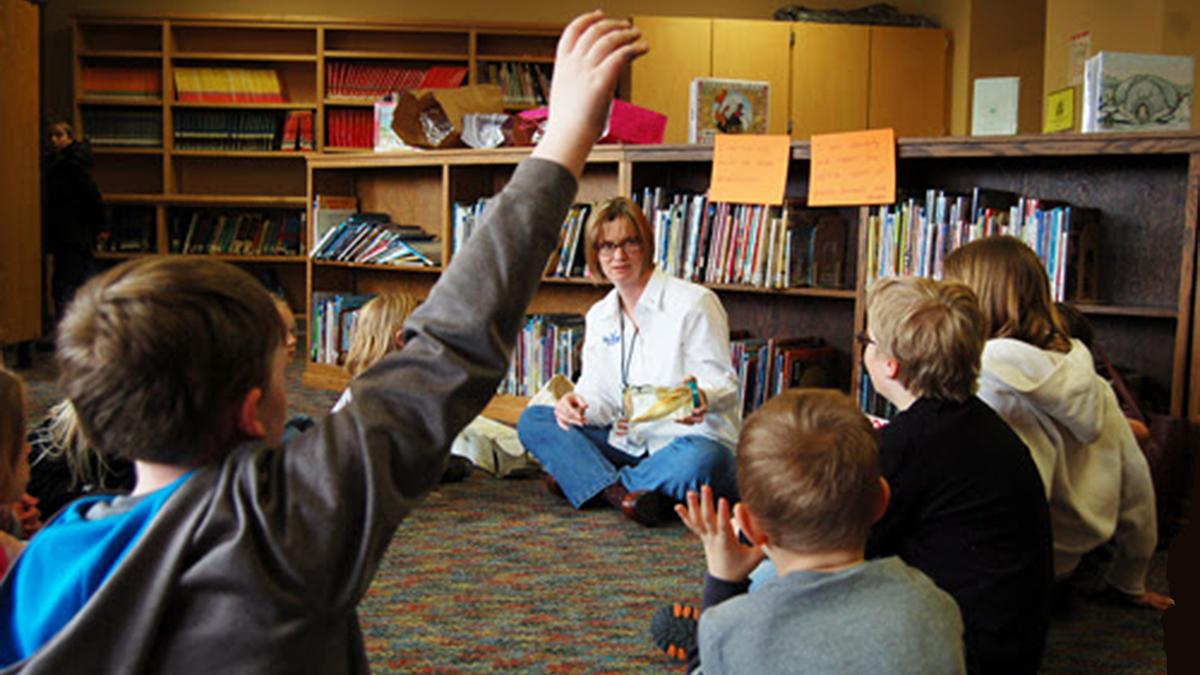Minnesota Sea Grant Extension Educator Marte Kitson received a top early career award from the Great Lakes Sea Grant Network at the group’s semi-annual meeting in Cleveland, Ohio on June 7, 2017.
“Kitson is a consummate Sea Grant extension professional who plays a vital role in the health of the Great Lakes region by taking the best science-based solutions produced by Sea Grant-funded researchers and others and making that information understandable and useful to Great Lakes residents, businesses and communities,” said Minnesota Sea Grant Director John Downing. “She is a wonderfully positive force and takes great initiative in seeking external grants to help Minnesota residents, businesses and educators.”
Kitson started her Minnesota Sea Grant career in community education and outreach on aquatic invasive species in July 2010. Before long she was successfully competing for extramural funding, leading novel outreach programs, expanding internship offerings and engagingly educating teachers, students and the public; and training state, county and municipal staff and business and industry representatives.
Kitson was also Minnesota’s education lead for three Minnesota Sea Grant-led EPA Great Lakes Restoration Initiative funded projects.
At nearly 7,000 square miles and encompassing more than 1,100 lakes, St. Louis County, Minnesota is the largest county in the United States east of the Mississippi. Effective aquatic invasive species outreach in an area so large is no small feat. When St. Louis County was deciding how best to use $680,000 appropriated by the Minnesota legislature to help prevent the spread of AIS, they turned to Minnesota Sea Grant. Kitson proved well up to the task and was the lead author on the St. Louis County Aquatic Invasive Species Prevention Plan that serves as a model in the Great Lakes region.
“Marte Kitson is a knowledgeable, respectful and positive leader in the field of AIS. She is focused on outcomes, while being flexible in developing practical solutions,” said St. Louis County Director of Planning and Community Development Barbara Hayden. “In working with partners, Marte makes people feel valued and brings out the best in others.”
Kitson laid the groundwork for Minnesota’s Surrender Events where owners of fish and other aquatic animals can give them up instead of releasing them into the wild if they are no longer wanted. Because of her work, the Minnesota Aquarium Society now incorporates fish surrender events in their auctions and the number of statewide surrender events is growing.
Early in her career Kitson recognized an opportunity to expand Minnesota Sea Grant’s undergraduate internship program. She identified a third-party stakeholder to fund undergraduate internships, and invited program partners to provide lab and field research components that undergraduates were looking for.
“When I ask prospective interns what they hope to get out of an internship, almost 100% of the time they’d say, ‘I want to do research in a lab or outside,’” Kitson said. “I wanted to find a way to make that happen because it’s really, really important. Now we offer internships that allow the student time to develop a credit-worthy project, engage in community outreach, and get them some research experience that also helps us implement Minnesota Sea Grant’s strategic plan. It’s a really well-rounded package that helps them build their professional portfolio.”
Since 2012, six Minnesota Sea Grant interns began careers in an environmental or data management field, and four are continuing to pursue undergraduate opportunities in science.
“Marte’s efforts led to an ongoing relationship with St. Louis County that facilitated consistent funding for internships, coordination among the grant recipients, and additional education and outreach efforts,” said Jesse Schomberg, Minnesota Sea Grant program leader and coastal communities and land use planning extension educator.
Kitson’s accomplishments extend from land to lake. In 2016, she co-led the first mentor-teacher multi-day shipboard science workshop aboard the S/V Denis Sullivan in collaboration with colleagues at Minnesota and Wisconsin Sea Grant on behalf of the Center for Great Lakes Literacy. A second shipboard science workshop is scheduled for August 13-19, 2017.
“These workshops are important for increasing Great Lakes environmental literacy throughout the region because teachers who are confident in science and Great Lakes concepts are more comfortable and effective teaching these subjects to their students,” said Kitson.
A note from an almost-eight-year-old taped to Kitson’s office door says much about how her work is valued: “Do you have a favorite lake, pond, possibly a river? Well think of slimy, gooey, Water areas. That is water with NO Sea Grant. Clear sparkling water is WITH Sea Grant.”
Minnesota Sea Grant facilitates interactions among the public and scientists to enhance the environment and economies along Lake Superior and Minnesota's inland waters by identifying information needs, fostering research, and communicating results. Minnesota Sea Grant is funded by the National Oceanic and Atmospheric Administration (NOAA) and the University of Minnesota. It is part of NOAA Sea Grant, a network of 33 similar science-based programs.
